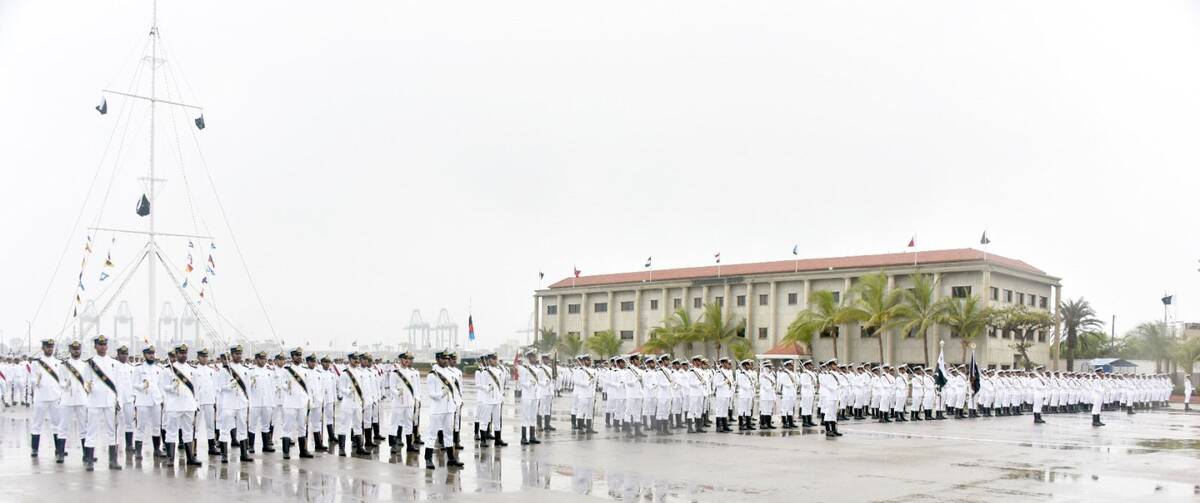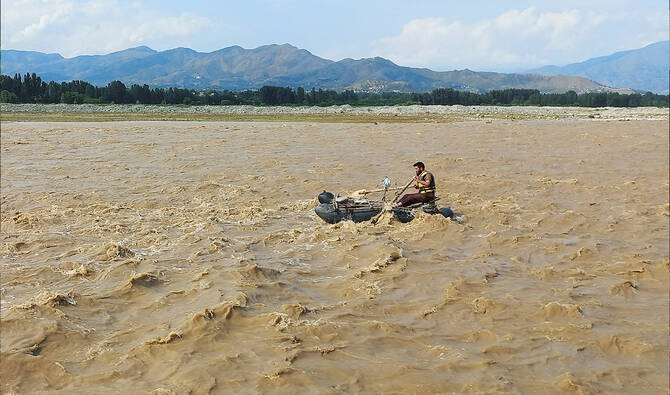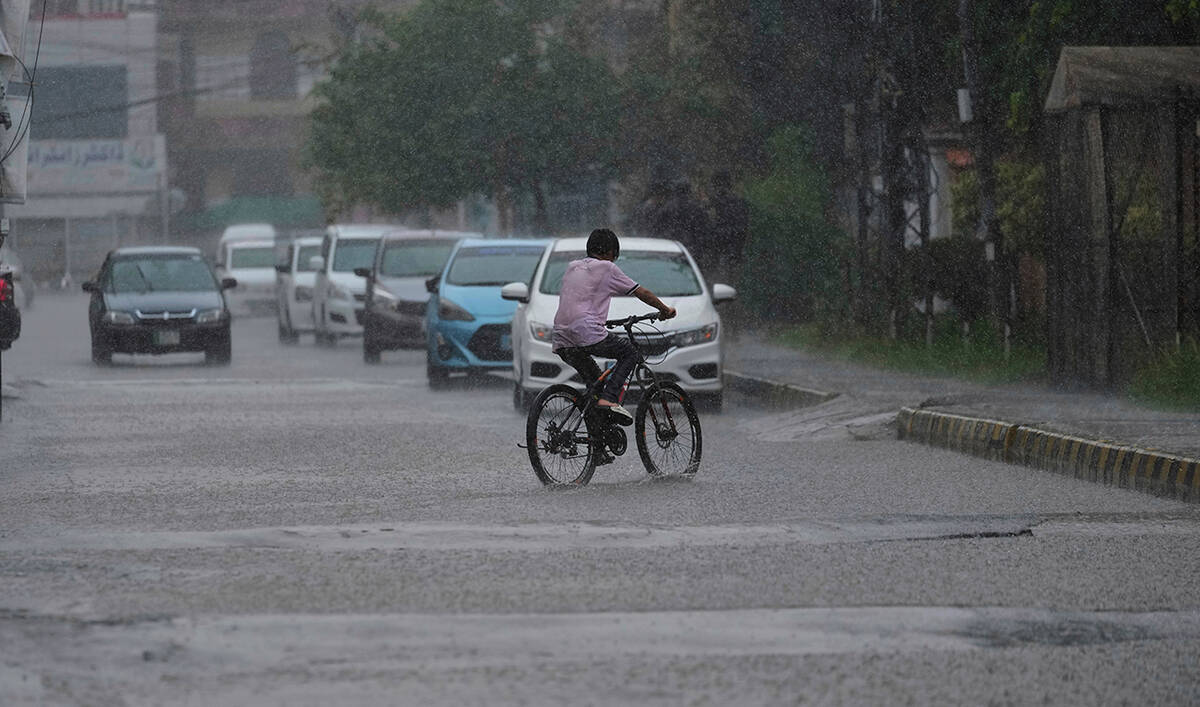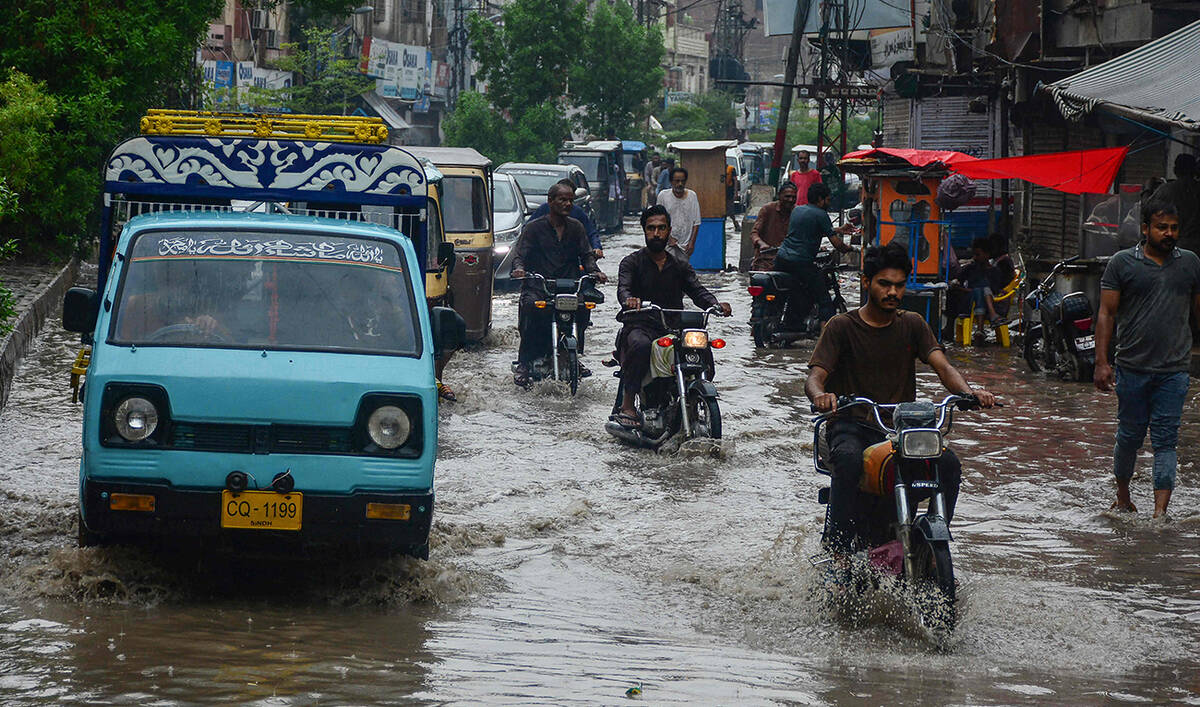ISLAMABAD: The price of solar panels has plummeted by over sixty percent in Pakistan in recent weeks due to bulk imports from China because of lower rates, importers said this week, with more consumers switching to the renewable source of power to reduce electricity bills.
The cost of producing solar panels in China, which accounts for about 80 percent of global consumption, plummeted by 42 percent in the last year, giving manufacturers there an enormous advantage over rivals in places like the United States and Europe. Multiple European solar manufacturers have announced plans to close factories in recent months, under price pressure from Chinese imports. China accounts for 80 percent of solar module production capacity after years of subsidies.
Pakistan has ideal climatic conditions for solar power generation, with over nine hours of sunlight in most parts of the country. Utilizing just 0.071 percent of the country’s area for solar photovoltaic (solar PV) power generation would meet Pakistan’s electricity demand, according to the World Bank.
But currently, only 5.4 percent of Pakistan’s installed power generation capacity of 39,772 megawatts comes from renewables like wind, solar and biomass, while fossil fuels still make up 63 percent of the fuel mix, followed by hydropower at 25 percent, according to the National Electric Power Regulatory Authority (NEPRA).
But this may change with an acute drop in the price of panels, importers said.
“A solar plate of 580 watts that I bought [last year] for 75,000 rupees [$270] has dropped to 25,000 rupees [$90] now,” Muhammad Yahya, a solar importer in Islamabad, told Arab News on Thursday. “That means it’s one-third of [earlier price].”
“The rates of the inverters are the same and keep fluctuating, but the main thing is solar panels and the rates of the solar panels are now 33 percent lower.”
Prices of solar panels dropped in China following import curtailment from major buyers including India, US and Europe while the Pakistani government had abolished a 17 percent sales tax to encourage solar imports, Yahya said, explaining the reduction in panel prices:
“People who would import through illegal channels, they [the government] blocked them, this helped stop the illegal import, and led to a bulk import, and secondly the rates [of solar panels] have dropped in China.”
Another solar panel importer in Islamabad, Abdul Moiz, agreed that the rate drop in China and curtailment of imports to India and other major buyers had led to bulk imports to Pakistan.
“America and India have stopped their imports [from China], that’s why the majority of the imports are now directed toward Pakistan,” Moiz told Arab News.
“CLIMATE CHANGE”
Despite the benefits, including to the environment of zero carbon emissions from solar panels, Pakistan is far behind in meeting its goal of shifting to 60 percent renewable energy by 2030 with 50 percent reduction in projected emissions.
Experts say procedural and bureaucratic delays in construction approvals and unattractive tariffs for selling power to the national grid coupled with a lack of political will and little government investment had blocked the progress of the solar industry in the past. For households, a big impediment, before the Chinese rate cuts, was the steep initial investment.
But that has changed, with electricity consumers describing the drop in solar panel prices as a ‘big relief’ in reducing their electricity bills.
“After its [solar panel] installation, our [electricity] cost has reduced to thirty percent,” Imran Ali Gul, a manager at a local hotel who has installed a 16kw system, told Arab News. “That’s why we preferred to get the solar system installed.”
Aamir Hussain, chairman Pakistan Alternative Energy Association, told Arab News Pakistanis purchased and installed solar panels of around 1800 megawatts last year, which was expected to jump to 3,000 megawatts this year due to the lower prices of the panels and increased customer demand.
“Pakistan will be spending over $3.5 billion [this year] on solar panels imports only as this doesn’t include import of batteries, inverters and other auxiliary items,” Hussain said. “Pakistan needs to follow consistent policies regarding renewable energy to meet its national and international obligations for the greenhouse gas emissions.”
Experts also said Pakistan, one of the most vulnerable nations to climate change impacts, needed to swiftly move to end its reliance on fossil fuels.
“There is no denying of the fact that climate change has wreaked havoc globally, so the studies suggest that in order to meet the global targets of reducing our temperature etc, in addition to transition of existing fossil fuel power plants, we should cap these fossils as well,” Manzoor Ahmed, a researcher at the Policy Research Institute for Equitable Development in Islamabad, told Arab News.
“So, given this roadmap, given our commitments in terms of net zero emissions or COP conferences where we agreed to meet global targets, we have no choice but to shift to renewables and we must do it.”
Demand for solar power rises in Pakistan as import glut crashes panel prices
https://arab.news/wju6g
Demand for solar power rises in Pakistan as import glut crashes panel prices

- Businessmen say solar panel prices have dropped by over sixty percent due to bulk import, rate cuts by China
- Islamabad currently only generates around five percent of its energy from renewable solutions like solar power
Pakistan army chief hails cadets from Arab and allied nations at Naval Academy graduation

- Among the 127 graduating midshipmen were 19 cadets from Bahrain, four from Iraq and two from Palestine
- The army chief says Pakistan’s response to India standoff showed armed forces ready to defend the country
ISLAMABAD: Pakistan’s army chief, Field Marshal Asim Munir, on Saturday hailed the presence of cadets from Arab and allied countries at a Naval Academy graduation ceremony, saying it reflected the high standard of training the country offers to its military partners.
The commissioning parade, held in Karachi, marked the completion of the 123rd Midshipmen and 31st Short Service Commission courses.
Among the 127 graduating midshipmen were 19 cadets from Bahrain, four from Iraq and two from the State of Palestine, with additional participants from the Republic of Djibouti and the Republic of Türkiye.
“The Pakistan Naval Academy has consistently provided excellent professional training to cadets from allied nations,” the army chief said, according to a statement issued by the military’s media wing, Inter-Services Public Relations (ISPR).

“The presence of cadets from Bahrain, Iraq, the State of Palestine, the Republic of Djibouti and the Republic of Türkiye in today’s commissioning parade is a reflection of the Academy’s high training standards,” he added.
Pakistan regularly trains cadets and officers from partner nations and sends its own officers abroad to institutions in countries such as the United States and the United Kingdom for advanced military education and joint training.
The ceremony was attended by senior officials from Pakistan and other countries, government representatives and families of the graduating cadets.

In his remarks, the army chief also praised the Navy’s professionalism and its efforts as a regional maritime force committed to securing international sea lines of communication.
He also referenced the recent standoff with India, saying the country’s armed forces had “responded swiftly and decisively against a numerically superior enemy,” and were fully prepared to defend Pakistan’s sovereignty.
Pakistan army chief vows retribution as 13 soldiers killed in militant attack in northwest

- Armed forces say 14 militants were killed in a firefight during a clearance operation after the convoy attack
- Field Marshal Asim Munir vows to avenge innocent Pakistani lives and respond swiftly to militant violence
KARACHI: Pakistan’s army chief, Field Marshal Asim Munir, on Saturday vowed retribution after 13 soldiers were killed in a suicide bombing on an armed forces convoy in the country’s northwestern tribal belt, in one of the deadliest attacks on security personnel in recent months.
The military said the convoy was targeted in Mir Ali, a town in North Waziristan near the Afghan border, when an explosives-laden vehicle rammed into one of the lead vehicles after a failed attempt by a suicide bomber to detonate earlier.
Three civilians, including two children and a woman, were also injured in the blast.
Militant violence has surged in northwestern Khyber Pakhtunkhwa province in recent years, particularly in the tribal region, where attacks have targeted soldiers, police, government officials and civilian residents.
Saturday’s assault marked one of the highest single-day tolls for security forces this year. The military said it was followed by the killing of 14 militants in a firefight during a clearance operation launched by the security forces.
“Field Marshal Syed Asim Munir … visited Corps Headquarters Peshawar today, where he was briefed in detail on the prevailing security situation and ongoing counter-terrorism operations,” the military’s media wing, Inter-Services Public Relations (ISPR), said in a statement. “During the visit, the Field Marshal also attended funeral of Shuhada [martyrs] of the incident at Bannu Garrison and visited the injured at Bannu CMH [Combined Military Hospital].”

“Reiterating the state’s uncompromising stance, the Chief of Army Staff vowed that all facilitators, abettors, and perpetrators of terrorism will be relentlessly pursued and brought to justice— without exception and at all costs, and the face of true perpetrator of terrorism in the region will be exposed to the entire world,” the statement added.
Most militant attacks in Khyber Pakhtunkhwa have been claimed by fighters belonging to the Tehreek-e-Taliban Pakistan (TTP), an umbrella group of armed factions that the Pakistani state refers to as khawarij — a term rooted in Islamic history used to describe a violent extremist sect that rebelled against authority and declared other Muslims as apostates.
The army described the assault as a “cowardly attack planned and orchestrated by the terrorist state of India” and executed by its “proxy Fitna Al-Khawarij.”
It said Pakistani forces intercepted the initial suicide bomber, but the attackers rammed a second explosive-laden vehicle into the convoy, killing 13 soldiers.

“The blood of every innocent Pakistani shall always be avenged,” the ISPR quoted the army chief as saying. “Any attempt to undermine Pakistan’s internal stability will be met with swift and decisive retribution.”
He also called for increased institutional support for civilian law enforcement agencies, particularly the Khyber Pakhtunkhwa Police, urging government stakeholders to prioritize capacity enhancement while reaffirming the army’s commitment to assist.
In a separate statement, Prime Minister Shehbaz Sharif condemned the attack, offering prayers for the fallen soldiers and condolences to their families. He praised the security forces for their response, including the killing of 14 militants, and said the entire nation saluted its martyrs.
“We are determined to eliminate every form of terrorism from the country,” Sharif said.
Pakistan plans to finalize Roosevelt Hotel privatization structure at next cabinet committee meeting
Pakistan plans to finalize Roosevelt Hotel privatization structure at next cabinet committee meeting

- Privatization Commission denies reports claiming a $100 million base price has been set for the hotel
- It points out the deal’s value will depend on the government-approved transaction structure, final terms
KARACHI: Pakistan is expected to finalize the transaction structure for the privatization of the Roosevelt Hotel in New York at the next meeting of the Cabinet Committee on Privatization, the government said in a statement on Saturday.
Located in Midtown Manhattan, the hotel is owned by Pakistan International Airlines Investment Limited (PIAIL) and occupies a full city block on Madison Avenue and 45th Street. It has also remained one of Pakistan’s most high-profile yet politically sensitive overseas assets.
“The base price and expected proceeds from the privatization of the Roosevelt Hotel will depend on the transaction structure and final terms approved by the government,” the Privatization Commission said in an official handout. “The transaction structure is expected to be finalized at the next meeting of the Cabinet Committee on Privatization.”
The statement informed no base price had yet been set for the property, rebutting some local media reports that claimed the government had fixed a $100 million floor.
It also pointed out such a value could only be determined at the time of bidding, adding that the deal’s potential value would depend on the transaction structure and final terms approved by the cabinet committee.
Over the past two decades, successive Pakistani governments have floated plans to sell, lease or redevelop the property, but no proposal has advanced beyond early-stage planning.
Earlier this month, Muhammad Ali, the prime minister’s adviser on privatization, told Arab News that the government had completed the hotel’s baseline valuation and appointed US-based consultancy JLL to conduct market sounding.
“We just need to get approval from the cabinet committee on the structure, and we’ll move ahead,” he said.
Pakistan tops global emerging market rankings in sovereign risk improvement — Bloomberg Intelligence
Pakistan tops global emerging market rankings in sovereign risk improvement — Bloomberg Intelligence

- Government calls the development ‘a resounding signal’ to investors about Pakistan’s improving economy
- It attributes the new outlook to economic stabilization, structural reforms and successful IMF engagement
KARACHI: Pakistan has recorded the world’s sharpest decline in sovereign default risk over the past year, topping Bloomberg Intelligence’s Global Emerging Market (EM) Rankings for credit risk improvement, according to new data cited by a senior finance official on Saturday.
The data, published by Bloomberg’s research arm, showed that Pakistan’s credit default swap-implied probability of default fell from 59 percent to 47 percent over the past 12 months, a drop of 11 percentage points. The change marks the biggest reduction among tracked emerging markets, outpacing countries like Argentina, Tunisia and Nigeria, as default risk rose in others such as Egypt, Gabon and Turkiye.
Credit default swaps (CDS) are insurance-like financial contracts that allow investors to hedge against the risk of a government failing to repay its debt. Issued and traded by large financial institutions, these contracts pay out in the event of a default. The higher the cost of a CDS, the greater the perceived risk. Bloomberg Intelligence uses CDS pricing to assess a country’s sovereign risk in its Global EM Rankings.
“Pakistan stands out globally as the most improved economy in terms of reduction in sovereign default risk,” said Khurram Schehzad, adviser to the finance minister, in a social media post. “This is a resounding signal to global investors: Pakistan is not only back on the map— it is moving forward with stability, credibility, and reform at its core,” he added.
Bloomberg Intelligence is a highly regarded financial data and media company widely used by global investors, analysts and institutions.
The improvement in Pakistan’s risk profile comes after the South Asian nation narrowly avoided a sovereign default in 2023. With dwindling reserves and mounting debt repayments, Islamabad secured a short-term bailout from the International Monetary Fund (IMF) with the support of key allies including Saudi Arabia, the United Arab Emirates and China.
Since then, Pakistan has undertaken a series of IMF-recommended structural reforms and fiscal adjustments aimed at stabilizing the economy.
Credit rating agencies such as Standard & Poor’s and Fitch have acknowledged the progress with improved outlooks, while the government has prioritized timely debt servicing and macroeconomic discipline.
Schehzad attributed the improved outlook to “macroeconomic stabilization, structural reforms, successful IMF engagement and timely debt repayments,” noting that investor confidence had begun to return.
Rains and floods kill 19 in Khyber Pakhtunkhwa, 12 in Punjab as extreme weather hits Pakistan

- Authorities in KP call Swat the most affected district where 13 people lost their lives in flash floods
- The Met Office warns the risk of heavy rains and floods remains high until the middle of the next week
PESHAWAR/KARACHI: At least 19 people have been killed and six injured in the past 48 hours in Pakistan’s northwestern Khyber Pakhtunkhwa (KP) province while heavy rains claimed another 12 lives in the most populous Punjab province, provincial disaster authorities said on Saturday.
KP’s Provincial Disaster Management Authority (PDMA) said that a total of 56 houses had been damaged in the region — 50 partially and six completely — while rain-related incidents were reported from various districts including Swat, Abbottabad, Charsadda, Malakand, Shangla, Lower Dir and Torghar.
“In the past 48 hours, rain, strong winds, flash floods and landslides in Khyber Pakhtunkhwa province have resulted in the deaths of 19 people and injuries to 6 others,” the PDMA said in a statement.

“The most affected district was Swat, where 13 people died and six others were injured,” it added.
The overall casualties in the province included six men, five women and eight children.
Local administrations have been instructed to provide immediate relief to affected families and ensure medical care for the injured.
The ongoing spell of rains, which began on June 25, has also claimed 12 lives in Punjab, the country’s most populous province, and caused delays in railway operations in the southern Sindh province.
“Twelve people died and 39 were injured in various accidents,” the Punjab PDMA said in a statement. “Majority of deaths were caused by the collapse of roofs and walls.”

Punjab PDMA chief Irfan Ali Kathia urged citizens to avoid unnecessary travel and not to stay in dilapidated homes during bad weather.

The Pakistan Meteorological Department has warned that the risk of heavy rains and possible flash floods will remain high until at least Tuesday.
Babar Raza, a spokesperson for Pakistan Railways, told Arab News the weather had affected the railway signaling system, while the speed of trains had been reduced for safety reasons.
“As a result, some trains are reaching their destinations with a delay of three to four hours,” he said. “No trains have been canceled so far.”
Pakistan, home to over 240 million people, is considered one of the world’s most vulnerable countries to the effects of climate change and faces extreme weather events with increasing frequency.
Last month, at least 24 people were killed in severe storms across the country, which has already experienced multiple extreme weather incidents this year, including hailstorms and spring downpours.









